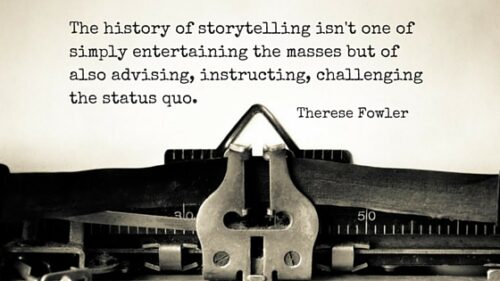7 Tips to Practicing the Craft of Instructional Storytelling
“Storytelling is ultimately a creative act of pattern recognition. Through characters, plot and setting, a writer creates places where previously invisible truths become visible. Or the storyteller posits a series of dots that the reader can connect.” Douglas Coupland
Storytelling is popular topic amongst L&D professionals. It’s the type of thing we all talk about, but do you actually practice your storytelling skills? If you do, what is it that you practice? I think we often practice our storytelling skills in very random places without even knowing it. Like, for example, in crafting an email, or Facebook post. Stories don’t need to be long. And stories can be told with pictures as well. But in this post I’ve limited my tips to writing and telling stories.
Learn the Basics of Storytelling Structure
All stories tend to follow a similar framework known as the story arc. Start by learning this basic structure. Its origin goes all the way back to Aristotle in 335 B.C. Since then we have similar templates to follow like the three-act structure typically used screenwriting. But you will find it in novels as well. This is the foundation that will make everything else you do make sense to you. Think about creating your next course with a three-act structure.
Read More Books About Storytelling
And read less about instructional design. I’m serious. Learning the craft of storytelling will take you further in your career. It’s takes much longer practicing to become a good storyteller than it does to learn instructional design. So start now. Start by reading great books about writing like Writing a Novel and Getting Published by Nigel Watts. Sure, it’s not specifically about writing training content, but all of what you learn applies to the work you do.
Listen to More Stories
I enjoy listening to podcasts. Not everyone does. But for me, especially when I’m driving, it’s better than the radio. There are many varieties to choose from. There are short practical podcasts that cover the mechanics like Grammar Girls Quick and Dirty Tips. And there are interview podcasts that speak with famous writers and story tellers. Listening to Tim Ferriss interview Seth Rogen and Evan Goldberg (2 comedic writers/storytellers) was hilarious and educational for me. You don’t need to find a podcast specifically about writing or storytelling either. Every good podcast that is highly rated often has great storytelling elements. Its what tends to make for a great podcast. And likewise, a great story can make for great learning content.
Informal Practice
We can tell stories. Informal practice can occur in our daily lives. We tell stories every day during regular conversations. And we don’t ever really put too much thought into telling them. We simply recall the facts and verbalize them. Some people are naturally more entertaining at this then others. If you happen to be on the “not-so-good” end of this spectrum, then telling the same story multiple times can be helpful. Most of us tell a good story one time. Then we’re bored with it and move on unless there is a reason to share that experience again. Try telling the same story in different ways to your friends.
Practice under Pressure
Events like The Moth are great for learning to craft your storytelling skills. Start by listening to the podcast of past events, or watching their YouTube channel. And then take the next step and tell your story at a Moth event. Actually, any event will do. I just wanted a reason to tell you about the Moth. It’s one of my favorites.
Write More of Your Own Stories
If you want to become better at writing instruction, you can start by just practicing the art of writing and telling stories. Many people do this in a daily journal. Recall the events of the day and write them down. But as you write be mindful of how you are telling the story of your day. Don’t take it so seriously that the habit becomes stressful. Just put a little thought into the little details. Try something new. Use a new word that you recently heard. Or tell the story of your day through the eyes of someone else.
Include Stories in Your Training
If you are a teacher/instructor/facilitator you should be telling stories during every training event you lead. If you’ve been running a particular course for a long period of time you may be getting bored with the topic. So, mix it up by either improving existing stories that you tell, or write new ones. Storytelling is a natural teaching tool for gaining attention, sharing examples, or transitioning to new topics amongst others. Your learners will most likely forget most of the facts in your course, but there is a high probability they will remember your stories.





